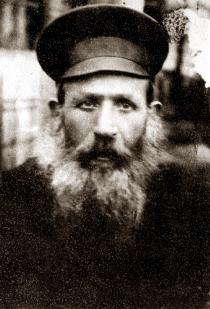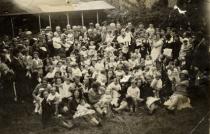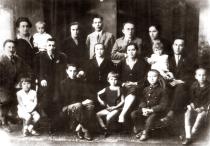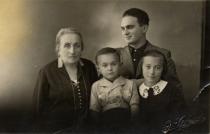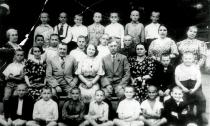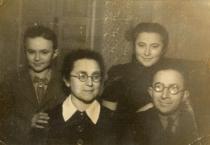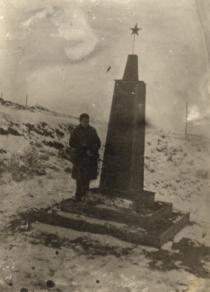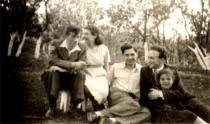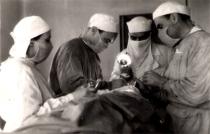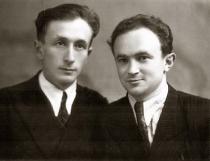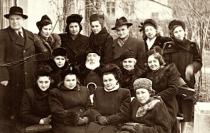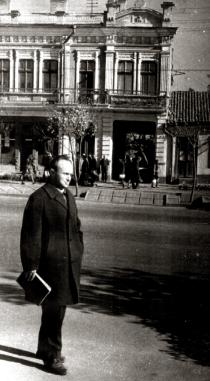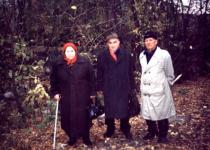This photo was taken in 2001 at the location of the camp in Alchevsk. I, David Wainshelboim, am in the center, on my left is Nina Anikeyeva, on her right is her husband, Nikolay Anikeyev. Nina is the daughter of Kuleshov, the righteous man, who rescued my sister and me in 1943, Nina was just a girl then, but she also took part in our rescue in Alchevsk. Her father has passed away by now. This photo was taken in 2001, when I visited the place of my family’s execution for the last time.
In July 1941 we arrived in Alchevsk. Alchevsk was in the rear and it seemed that the Fascists were never to reach it. Our family decided to stay there. My father went to the town department of health and was appointed chief doctor of a hospital. We received a room at the hospital and settled there. There was little space to live, but we didn’t fret, having a roof over our heads and also, my father had a job. My sister, who had finished school, went to work as a receptionist at the hospital. I went to the eighth grade of a local school.
The front line was approaching and German troops were already in the vicinity of Debaltsevo. I still can’t understand why my father failed to arrange for us to depart farther to the east. He was probably too busy at work. There were flows of the wounded delivered to the hospital from the front. Anyway, on 12th July 1942 the Fascist tanks and motor units entered Alchevsk. We were at home. A German trooper broke into the room: ‘Juden, Uhr!’ [‘Jews, watches’ in German]. I gave him a watch and he left.
A few days we were lined in columns and convoyed to the barracks located in the northern part of the town, near the metallurgical plant. There was a camp arranged there, I never heard any name of this camp. We slept on planks on the floor of the barracks. Some time later my father managed to make cloth partials to separate us from others. Every day we were taken to work, cleaning toilets in the town, dragging logs and cleaning the territory of the plant. We weren’t given any food or water. Many inmates starved to death. Ukrainians came to the camp bringing potatoes, vegetables, bread or pork fat to exchange them for clothes. Many inmates were getting ill. My father supported people, but the only help he could offer was a kind word. There were no medications available. So we existed for about half a year. In January 1943 my father was ordered to make his appearance at the camp commander’s office and he never returned from there. We got to know that he had been taken to jail. I never saw him again.
There were rumors in the camp that Fascists were preparing for the massacre of inmates. Mama insisted that my sister and I escaped. In early February we got a chance to do so: a policeman agreed to take us out of the camp for a bribe. Mama hugged me and I ran out of the barrack. This was how we said ‘good bye.’ We were taken out of the camp at night. My sister and I went to the hospital where our father had worked. We came to see the logistics manager of the hospital, a Ukrainian, Kuleshov, with whom our father had worked. He gave us shelter and we stayed in his house for several days.
In September 1943 I wrote to my former Tatar classmate Chiitov in Alchevsk, asking him to tell me what had happened to my family. My friend told me that they were dead. My father was executed in the yard of his jail in early February 1942 – later I obtained a certificate of his death from the archive – and that Mama and Grandma were executed at about this same time in a quarry of the plant and so were other Jewish inmates of the camp.
After the war I visited Alchevsk. My friend and I went to the scene of execution. I was told that in spring 1943 the graves were opened since all the dogs gathered to the terrible smell of the graves. They ate the human remains, probably including those of my parents. After the liberation of the town, a small monument was installed at this place. My friends photographed me beside this obelisk, and this horrible memory about this place where my parents and grandmother Sarrah perished has stayed with me for the rest of my life.
Every two-three years I visited the place where my parents and grandmother died. The obelisk installed there is gone. There is a huge plant at the place where they died. Though local authorities state that they hauled the remains to the cemetery, the cemetery is abandoned and nobody takes care of it. I met a woman there. Her surname is Pinskaya. Her mother left her as a baby on the road side and a Ukrainian woman picked her up. Only when she grew up, did the girl hear about where she came from. She was the only survivor of the massacre in Alchevsk. She and I try to convince the local authorities to restore the monument, but it seems nobody else cares about it and things are still where they were before.

